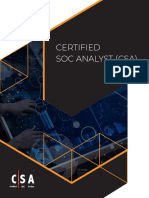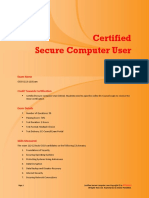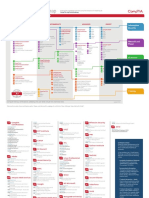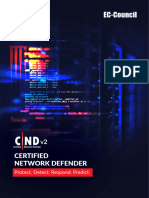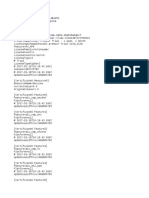CND v2
Certified Network Defender
Course Agenda
sales@infosectrain.com | www.infosectrain.com
�Index
Overview
Why CND v2
Target Audience
Pre-requisite
Exam Information
Course Objectives
sales@infosectrain.com | www.infosectrain.com
�Overview
Certified Network Defender (CND) by EC-Council strengthens the fundamentals of
network security. It provides an in-depth understanding of network security issues
and trains network defenders on dealing with them.
CND v2 is the first course in the new Vulnerability Assessment and Penetration
Testing (VAPT) Track developed by EC-Council. In the latest version, EC-Council has
added and removed domains to focus on a comprehensive approach to deal with
current network security issues. The course authenticates your understanding of
critical and core concepts of network and information security.
Why CND v2
CND is globally recognized and most sought-after credentials in the field of network
security. The new version is based on the cybersecurity education framework and
work-role task analysis presented by the National Initiative of Cybersecurity Educa-
tion (NICE).
The new concept of following the “Predict, Protect, Detect, Respond” cycle by
EC-Council has enhanced the learning takeaways by providing a complete package
required to defend a network.
Successful completion of CND program and passing the certification exam not only
optimize your career opportunities but also provides you an edge over existing com-
petition.
Target Audience
Network administrator
Network security professional
Security professional or auditor
Site administrator
Any individual working towards the enterprise and network infrastructure security
Pre-requisite
Basic idea of networking and its components
sales@infosectrain.com | www.infosectrain.com
�Exam Information
Test Duration: 4 Hours
Test Format: Multiple Choice
Number of Questions: 100
Test Delivery: ECC EXAM
Exam Prefix: 312-38 (ECC EXAM)
Passing Score: EC council provides exam in the form of various question banks
with different difficulty levels. Passing scores can range from 60% to 85%,
depending on which form is challenged.
Course Objectives
The courseware of CND is designed to develop a strong and deep understanding of
various verticals of networking, talking first about various network and defense
strategies proceeding to incident detection and response and advancing to threat
assessments and intelligence. Below is the list of modules with a brief description of
what they talk about.
Module 01: Network Attacks and Defense Strategies: This module introduces
you to different network-based attacks faced by the organization to understand
their working and develop defense strategies.
Module 02: Administrative Network Security: It involves developing or updating
security infrastructure and continuously monitoring networks for any suspicious
actions or unauthorized access
Module 03: Technical Network Security: Implementing authentication and protec-
tion controls for user verification to avoid theft of sensitive information or data.
Introducing the concept of zero trust and its effectiveness in maintaining a
better security posture
Module 04: Network Perimeter Security: Implementation and management of
perimeter devices like firewalls, Intrusion Detection Systems, Intrusion Preven-
tion Systems
Module 05: Endpoint Security-Windows Systems: Security of end-user devices
and entry points by implying endpoint security on Windows devices.
sales@infosectrain.com | www.infosectrain.com
�Module 06: Endpoint Security-Linux Systems: Securing entry points or end-user
devices by ensuring endpoint security on Linux devices
Module 07: Endpoint Security- Mobile Devices: Securing entry points or end-us-
er devices by ensuring endpoint security on mobile devices
Module 08: Endpoint Security-IoT Devices: Fundamentals of IoT, IoT threats and
security using endpoint security implementation
Module 09: Administrative Application Security: Understanding the methodolo-
gies of administrative application security and its importance to minimize the
security-related vulnerabilities in the application
Module 10: Data Security: Implementing policies to safeguard data from unau-
thorized access using various techniques like encryption, hashing, tokenization
and other key management practices. Concept of data storage, data classifica-
tion, data masking, retention and destruction
Module 11: Enterprise Virtual Network Security: In-depth understanding of virtu-
alization, related threats and security. Essentials of software-defined network
(SDN) security, network function virtualization (NFV) security
Module 12: Enterprise Cloud Network Security: Introduction to cloud computing,
threats, challenges and security across cloud platforms, concepts of container
security, docker security, and Kubernetes security
Module 13: Enterprise Wireless Network Security: Understanding of wireless
network security essentials, threats, attacks and countermeasures.
Module 14: Network Traffic Monitoring and Analysis: Analysis and monitoring of
logs from various perimeter network devices to identify any anomalies in the
traffic.
Module 15: Network Logs Monitoring and Analysis: Analyzing the events gener-
ated by various devices in the network to identify signs of any suspicious activi-
ty or a potential incident
Module 16: Incident Response and Forensic Investigation: Understanding of
incident management response process and methodologies to be followed in
case of security incidents. Understanding of forensics investigation techniques
and tools used for analysis.
sales@infosectrain.com | www.infosectrain.com
�Module 17: Business Continuity and Disaster Recovery: Understanding the impor-
tance of BCP and DR, related concepts and procedures required to allow smooth
functioning of operations in case of a disaster
Module 18: Risk Anticipation with Risk Management: Risk management process,
analyzing various risks that the organization is susceptible to and developing poli-
cies to manage them.
Module 19: Threat Assessment with Attack Surface Analysis: Analyzing the threats
and attack vectors to develop solutions for their countermeasures
Module 20: Threat Prediction with Cyber Threat Intelligence: Developing a proac-
tive approach by understanding various frameworks aiding in threat intelligence to
anticipate the kinds of attacks hackers could use to gain access to the network.
sales@infosectrain.com | www.infosectrain.com
�sales@infosectrain.com | www.infosectrain.com

